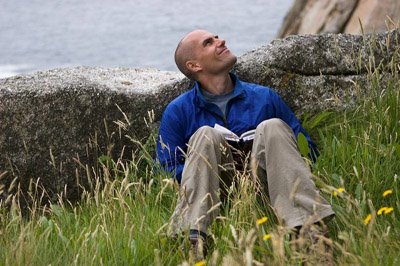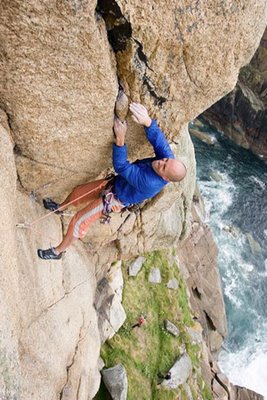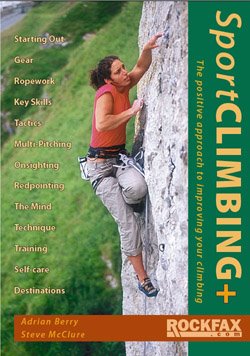Climber interview - Adrian Berry
Next up in OCC's series of interviews is Adrian Berry, one of the better known british trad climbers and one of our most experienced coaches. In his climbing career Adrian has climbed E10, redpointed 8b+ and been a member of the British competition climbing team. He's begun to coach climbing more and more and I was interested to find out what patterns he's noticed in climbing over recent years and how he's responded to these with his climbing and his coaching.

Adrian Berry (Photo: Duncan Skelton)
OCC: How do you think fashions in the climbing scene affect how climbers at large train/prepare for their routes?
Adrian: To be honest Dave, I think fashions in climbing affect a very, very small number of climbers, generally operating at the higher grades. If you look at, say, deep-water soloing for example, it seems to have exploded in popularity, but in fact there are maybe a couple of hundred climbers at most doing it regularly, there are probably more aid climbers. I would say that considerably less than one percent of climbers actually train, a lot go to the wall, but it’s used as an extension of climbing outside and a bit of a social, more than a training facility. I think this is largely down to the improvement of climbing walls, they are just a lot more fun now.
OCC: What changes have you noticed in climbers over the last decade – are they stronger? fitter? mentally tougher? Moving better? How do you think climbing walls are influencing standards and fashions?
Adrian: I don’t think much as come along in the last ten years, to be honest. Ten year’s ago, the hardest route in the UK was Neil Carson’s The Big Bang (9a), at the time there were maybe a couple of other people capable of that grade in the UK – and the same is true now. There is a larger pool of climbers operating just below the ‘cutting edge’ than there was ten years ago, but I would say the average climber climbed about HVS back then, and still climbs HVS. You only have to go to any busy crag in the country, sit and watch, and you’ll see few climbers even taking on HVSs. I thin that this is simply down to a booming economy, people are earning far more than they were, with bloody big mortgages to pay off. The idea of quitting your job to go climbing just isn’t happening any more. Here in Sheffield there used to be a large climbing population on the dole, just training and climbing, arguably, the boom in standards was the result of the bust of the economy and vice versa, it’s no surprise that the country’s producing the most super-climbers are economically the least developed.
In a word, ‘it’s the economy, stupid’.
One more thing that has had a major change, has been the failure of the club system to educate climbers. Today, climbers learn the basics of safety, then they’re on their own. There’s no apprenticeship, you can belay OK? Right then, you’re a climber. This all began with the clubs stopping taking out beginners because of the fear of litigations. The rot started there. For the last five years, I’ve been working to try to reverse that by raising the profile of climbing coaching, which sorely needed to fill the knowledge gap. Fortunately, that’s one thing a booming economy is helping, economic restructuring has merely commoditised the advice that use to be ‘free’, still, it keep us in work, eh?
OCC: When you coach climbing, what pieces of advice do you find reminding people again and again that surprises you?
Adrian: Boy, that’s a big one, here are some that spring to mind:
- Footwear choice – technical climbing requires technical shoes – you’ve got to have the right shoes, and yes, they will hurt for a bit.
- Rear wheel drive – thinking in terms of following a line of foot holds rather than hand-holds – getting stuck is 95% due to looking for hand holds as opposed to using obvious foot holds.
- Reversing – time and again, I watch climbers climb into the most strenuous position on the route, stay they as long as they can, they call to be taken onto the rope. Reversing – even to the ground isn’t going to get you a ticket from the ethics police – it’s just good sense!
- Following from the last point – I find many Brits obsess over ethics, and what they CAN’T DO, rather than what they CAN. Be positive!
OCC: In getting better at climbing, really attacking your weaknesses, dislikes and bad habits is inevitably the sticking point for climbers improvement. Which weaknesses have you overcome to get to the standard you’re at just now, and which have you still to overcome?
Adrian: I would say my biggest weakness is definitely my head. I like to be in control, and you can’t be all the time. I absolutely HATE falling off, and can go for years without taking a fall, which is really sad! I’ve been dropped, and smashed into the wall a few times, which hasn’t helped me. I have found that on a recent trip through France and Spain, by getting on harder routes onsight (I was working up to onsighting 8a) I found my head got really sorted, just because the climbing felt so hard I didn’t have time to get anxious. I also make sure I do a few practice falls early on a trip now, just to get my head in gear. I don’t think I will ever like falling off, but I’m not afraid to confront it and it gets easier. I have found that explaining dynamic belaying to my partner helps a lot. My other, big weakness is exposure – it really affects me, I have to admit that my tactic here is to avoid it!
OCC: What importance do you place on doing a high volume of easier ‘milage’ climbing (indoors or out) for the purpose of sharpening movement technique? Do you see it as being commonly neglected, or the opposite - overrated?
Adrian: I swear by it – 70% of my climbing is soloing VS – E1 on grit, I can go out and do thirty routes in a couple of hours – I absolutely love it and by the end of the day you move without thought, which has to be the end goal. You can’t really work technique on hard climbs, at least I can’t. It is also great for developing capilliarity (blood supply to your forearms), which makes recovery much faster.
OCC: Many climbers who are not interested in bouldering as an end in itself in climbing, don’t practice it in their training either. Do you agree with this and do you think these people should make the effort to do more? If so, why?
Adrian: There is this idea at the moment that bouldering is a new thing – rubbish, you only have to look at the new BMC grit guide (Burbage and Beyond) to read quotes about bouldering from the early 1900s! The difference bouldering makes to your climbing is stark – when I have a new client, I can tell almost immediately whether they boulder or not. Moving beyond HVS without bouldering is going to be really tough, not just because it’s really hard to develop the strength, and technical range to tackle the moves, but because bouldering teaches you how to TRY. Bouldering is about repeated failure, and getting use to it. It’s about slapping for holds in an all-but-hopeless situation with the hope that just maybe you’ll make it. Applying that to routes will immediately gain you a leap of several grades. I love bouldering – but bouldering with a small ‘b’. I’m not a big fan of Bouldering (capital B) with its sitting starts, and daft rules – but then I’m not very good at it!
OCC: What elements of training do you think have held you back from climbing even harder than your current level?
Adrian: When I was training a lot, back when I was on the British team, there was really no advice as to how to do it. I got into this rut of climbing laps on routes in the mid 7s, then flying out somewhere to compete on routes in the mid 8s – naturally, I didn’t manage too well. After I quit international competitions, I had a big rethink on training, and did my own thing, which involved circuit training, with lots of one handed dead hangs in stress positions – some clips – and at a much higher intensity. This made a massive difference. If I’d know this back then, I would have been getting into the semi finals – though I think I would have had to have been doing since the age of six to have won!
OCC: Is there anything that you know now as an experienced coach that you wish you’d known as a novice climber?
- Being afraid of falling is the single greatest limitation to your climbing.
- Take advice with sceptical mind – mind included.
- Beware of the BS – and never let a tale of woe stop you trying a route – routes are never as bad as climbers who’ve failed on them make them sound.
- Treat your partners better than you would treat any of your kit – they are far more important.
Adrian: There is this idea at the moment that bouldering is a new thing – rubbish, you only have to look at the new BMC grit guide (Burbage and Beyond) to read quotes about bouldering from the early 1900s! The difference bouldering makes to your climbing is stark – when I have a new client, I can tell almost immediately whether they boulder or not. Moving beyond HVS without bouldering is going to be really tough, not just because it’s really hard to develop the strength, and technical range to tackle the moves, but because bouldering teaches you how to TRY. Bouldering is about repeated failure, and getting use to it. It’s about slapping for holds in an all-but-hopeless situation with the hope that just maybe you’ll make it. Applying that to routes will immediately gain you a leap of several grades. I love bouldering – but bouldering with a small ‘b’. I’m not a big fan of Bouldering (capital B) with its sitting starts, and daft rules – but then I’m not very good at it!
OCC: What elements of training do you think have held you back from climbing even harder than your current level?
Adrian: When I was training a lot, back when I was on the British team, there was really no advice as to how to do it. I got into this rut of climbing laps on routes in the mid 7s, then flying out somewhere to compete on routes in the mid 8s – naturally, I didn’t manage too well. After I quit international competitions, I had a big rethink on training, and did my own thing, which involved circuit training, with lots of one handed dead hangs in stress positions – some clips – and at a much higher intensity. This made a massive difference. If I’d know this back then, I would have been getting into the semi finals – though I think I would have had to have been doing since the age of six to have won!
OCC: Is there anything that you know now as an experienced coach that you wish you’d known as a novice climber?
- Being afraid of falling is the single greatest limitation to your climbing.
- Take advice with sceptical mind – mind included.
- Beware of the BS – and never let a tale of woe stop you trying a route – routes are never as bad as climbers who’ve failed on them make them sound.
- Treat your partners better than you would treat any of your kit – they are far more important.
Thanks Adrian! I really like the idea of 'rear wheel drive' - thats something you can tell yourself in the heat of battle when you are about to come off. Adrian has been working on a book about improving at sport climbing which will be out in a couple of months. Click on the cover below to check out Adrian's coaching site.






3 comments:
I liked the interview Dave and Adrian.
It's good to hear that someone like Adrian has the same fears about falling and exposure that i do and that he's managed to deal with that and climbed some amazing stuff. Fantastic!
There's hope for me yet :-)
Cheers
Lots of interesting comments here from Adrain but, being pedantic, this - it’s no surprise that the country’s producing the most super-climbers are economically the least developed - is complete nonsense.
I believe everyone must look at this.
Post a Comment